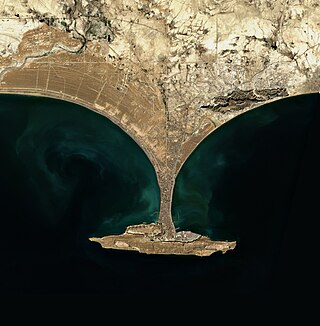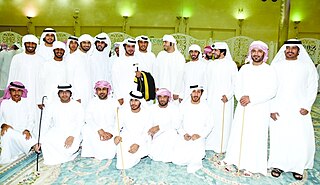
Balochistan is a province of Pakistan. Located in the southwestern region of the country, Balochistan is the largest province of Pakistan by land area but is the least populated one. It is bordered by the Pakistani provinces of Khyber Pakhtunkhwa to the north-east, Punjab to the east and Sindh to the south-east; shares international borders with Iran to the west and Afghanistan to the north; and is bound by the Arabian Sea to the south. Balochistan is an extensive plateau of rough terrain divided into basins by ranges of sufficient heights and ruggedness. It has the world's largest deep sea port, the Port of Gwadar lying in the Arabian Sea.

The Gulf of Oman or Sea of Oman, also known as Gulf of Makran or Sea of Makran, is a gulf in the Indian Ocean that connects the Arabian Sea with the Strait of Hormuz, which then runs to the Persian Gulf. It borders Iran and Pakistan on the north, Oman on the south, and the United Arab Emirates on the west.

Makran, also mentioned in some sources as Mecran and Mokrān, is the southern coastal region of Balochistan. It is a semi-desert coastal strip in the Balochistan province in Pakistan and in Iran, along the coast of the Gulf of Oman. It extends westwards, from the Sonmiani Bay to the northwest of Karachi in the east, to the fringes of the region of Bashkardia/Bāšgerd in the southern part of the Sistan and Baluchestan province of modern Iran. Makrān is thus bisected by the modern political boundary between Pakistan and Iran.

The Baloch or Baluch are a nomadic, pastoral, ethnic group which speaks the Western Iranic Balochi language and is native to the Balochistan region of South and Western Asia, encompassing the countries of Pakistan, Iran, and Afghanistan. There are also Baloch diaspora communities in neighbouring regions, including in Central Asia, and the Arabian Peninsula.

Gwadar is a port city on the southwestern coast of the Pakistani province of Balochistan. The city is located on the shores of the Arabian Sea, opposite Oman and has a population of over 90,000, according to the 2017 census. It was an overseas possession of Oman from 1783 to 1958. It is about 120 km (75 mi) southwest of Turbat. The sister port city of Chabahar in Iran's Sistan ve Baluchestan province is about 170 km (110 mi) to the west of Gwadar. On 2 April 2021, it was declared the winter capital of Balochistan.

Turbat is a city in southern Balochistan, Pakistan. It is the administrative centre of Kech District. Situated on the bank of the Kech River, Turbat was the historical capital of the State of Makran. Turbat is the second-largest city in Balochistan after Quetta and the 38th largest city of Pakistan. It is the largest city in the southern part of the province. The Gwadar Port lies 180 kilometres (110 mi) southwest of Turbat.

The Khanate of Kalat was a Brahui Khanate that originated in the modern-day Kalat region of Pakistan. Formed in 1666 due to the threat of Mughal expansion in the region, it controlled the wider Balochistan at its greatest extent in the mid-18th century, extending from Kerman in the west to Sindh in the east and from Helmand River in the north to the Arabian Sea in the south. The Khanate of Kalat lost considerable area to Qajar Iran and the Emirate of Afghanistan in the early 19th century, and the city of Kalat was itself sacked by the British in 1839.

Makran was an autonomous princely state in a subsidiary alliance with British India until 1947, before being absorbed as an autonomous princely state of Pakistan. It ceased to exist in 1955. It was located in the extreme southwest of present-day Pakistan, an area now parts of the districts of Gwadar, Kech and Panjgur. The state did not include the enclave of Omani Gwadar, which was under Omani rule until 1958.
Hashim Saleh Mohammed Al-Balushi, commonly known as Hashim Saleh, is an Omani footballer. He also played for the Oman national team for a decade.

The Baloch diaspora refers to Baloch people, and their descendants, who have immigrated to places outside the Balochistan region of South-West Asia – a region stretching from southwestern Pakistan to southeastern Iran and southern Afghanistan. The Baloch diaspora is found throughout the Middle East, South Asia, Turkmenistan, East Africa, Europe, North America and in other parts of the world.

Omanis are the nationals of Sultanate of Oman, located in the southeastern coast of the Arabian Peninsula. Omanis have inhabited the territory that is now Oman. In the eighteenth century, an alliance of traders and rulers transformed Muscat into the leading port of the Persian Gulf. Omani people are ethnically diverse; the Omani citizen population consists of many different ethnic groups. The majority of the population consists of Arabs, with many of these Arabs being Swahili language speakers and returnees from the Swahili Coast, particularly Zanzibar.
Yakub, Yaqub, Yaqoob, Yaqoub, Yacoub, Yakoub or Yaâkub is a male given name. It is the Arabic version of Jacob and James. The Arabic form Ya'qūb/Ya'kūb may be direct from the Hebrew or indirectly through Syriac. The name was in use in pre-Islamic Arabia and is a common given name in Arab, Turkish, and Muslim societies. It is also used as a surname. It is common in Polish, Czech and Slovak languages, where it is transliterated as Jakub.

Mulla Kamal Khan or Kamalan was a Baluch folklore vocalist. He was born in 1941 in the village of Latidan, Dashtyari district, Chabahar County in the Sistan and Baluchistan province of Iran. His talent was first discovered in a traditional Balochi wedding ceremony, where many Baloch tribesmen gathered to listen traditional Balochi heroic songs. He went on to become one of the most influential singers in Baluchistan and gained fame among Baloch people and even among non-Balochis.
Tourism in Balochistan is a developing industry, and is overseen by the Tourism Directorate under the Government of Balochistan. Balochistan is known for its long coastal belt which extends from Karachi through Sonmiani, Ormara, Kalmat, Pasni, Gwadar, Jiwani and all the way up to Iran. It is also popular for its hill tops and rugged mountainous terrain.
Baloch people in the United Arab Emirates comprise residents of the United Arab Emirates of Baloch ancestry, whose ancestral roots lie in Balochistan. Like Balochs in other Gulf states.
The Jaḍgāl is an Indo-Aryan ethno-linguistic group which speaks the Jadgali language. Jadgals are present in the Balochistan region of Iran and Pakistan, as well as in Oman.
The Jats of Balochistan are tribes of Jat origin found in the Balochistan province of Pakistan. They are estimated to be around 10% of the total population of Balochistan, being the fourth largest ethnic group of Balochistan. A large proportion are in the profession of camel herding. Jadgals are another Jat ethnic group living in Balochistan.

The Gwadar Purchase was the acquisition of the territory of Gwadar by Pakistan from the Sultanate of Oman in 1958. Pakistan was able to acquire 15,210 square kilometres (5,870 sq mi) of land on the coast of Balochistan for around 5.5 billion Pakistani rupee, paid mostly by Aga Khan IV.
Omani Baloch are the nationals of the Sultanate of Oman who are of Baloch ancestry. Around 20% of Omanis are of Baloch descent whose ancestors migrated to Oman centuries ago, and are now considered native. Baloch form the largest non-Arab community in Oman, and most of them have Al-Balushi as surname. Baloch served as mercenary soldiers for Oman between 18th and 20th century. The first modern army of Oman was exclusively Baloch, and even today around 40% of Omani Army consists of Baloch people. A significant population of Omani Baloch is of Zadjali origins.

The Balush ; singular Al-Balushi One of the Arab Bedouin tribes, Members of the Tribe are found in Oman and the United Arab Emirates, Jordan, Kuwait, Qatar, Bahrain, Saudi Arabia, Yemen, The Balush Tribe is A Branch of Al-Zaffa clan while the origins of Al-Zaffa clan are from the Al-Ahamdah clan. and Al-Ahamdah branched into many tribes in the countries of the Levant, after a migration from Hijaz (Yemen) to the Levant started from the lineage [Khozam From Qahtan] until the Tribe Appeared and Named (Balush) in the Levant.













